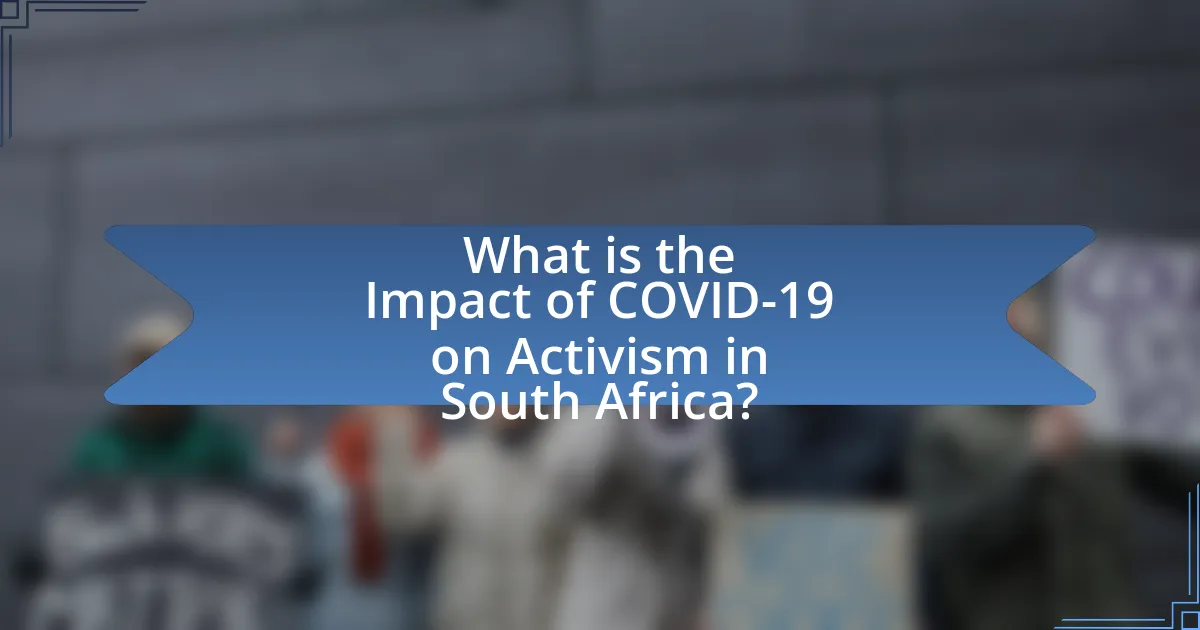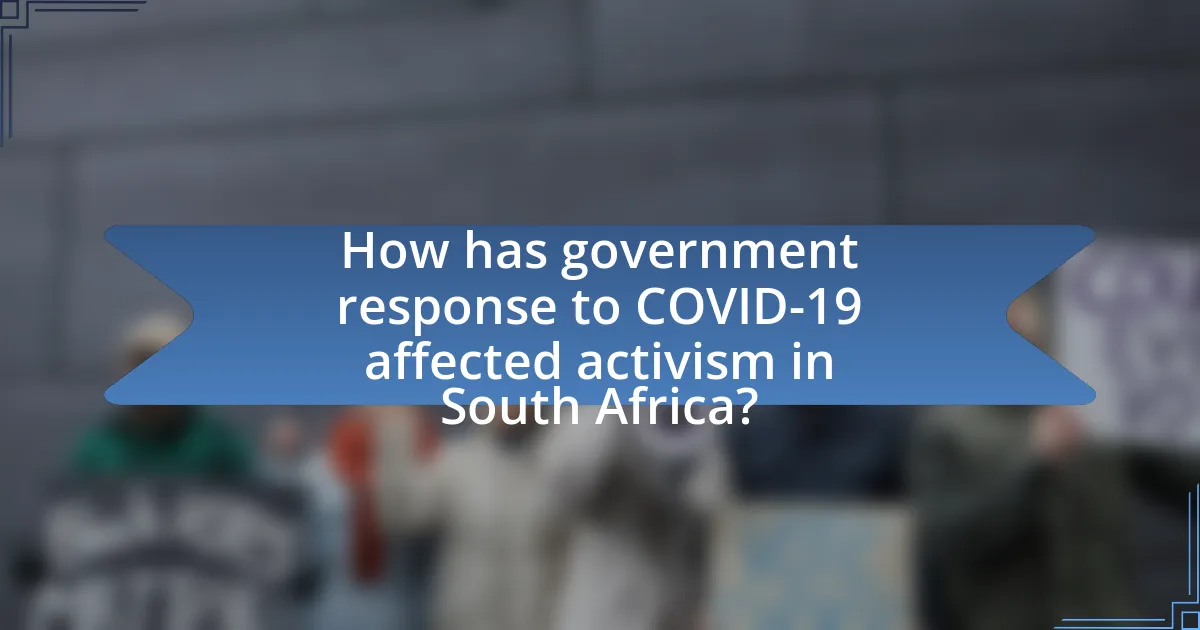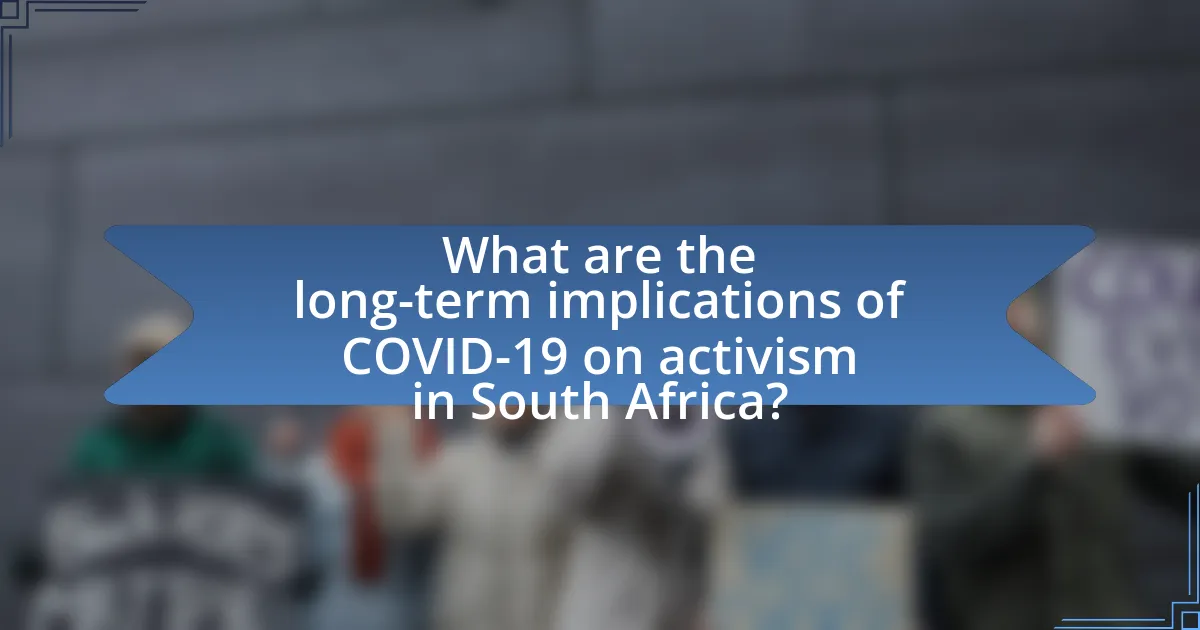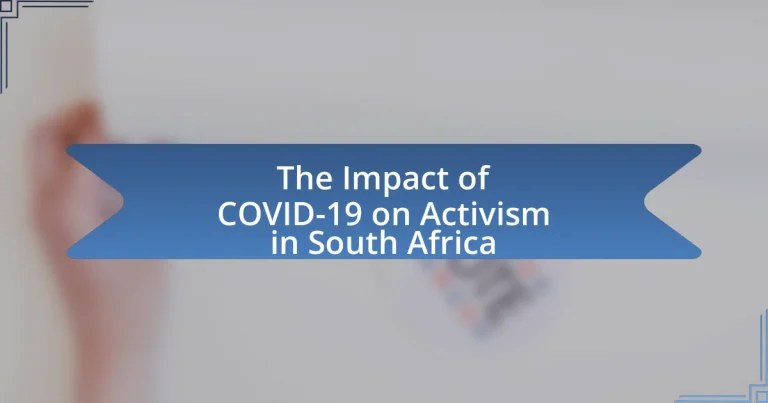The article examines the significant impact of COVID-19 on activism in South Africa, highlighting the challenges and adaptations faced by activists during the pandemic. It discusses how restrictions on gatherings led to a shift towards digital platforms for advocacy, enabling movements like #BlackLivesMatter to gain traction. Key issues such as increased inequality, social justice, and healthcare access are explored, alongside the changing dynamics between activists and law enforcement. The article also outlines the long-term implications for activism, emphasizing the importance of technology and community engagement in shaping future movements.

What is the Impact of COVID-19 on Activism in South Africa?
The impact of COVID-19 on activism in South Africa has been significant, leading to both challenges and adaptations within the activist community. Activists faced restrictions on gatherings and protests due to lockdown measures, which hindered traditional forms of mobilization. However, this situation also accelerated the use of digital platforms for advocacy, allowing movements to reach broader audiences and engage in online campaigns. For instance, the #BlackLivesMatter movement gained traction in South Africa during the pandemic, demonstrating how social media can facilitate activism even in restrictive environments. Additionally, the pandemic highlighted issues such as inequality and access to healthcare, prompting increased activism focused on social justice and public health.
How has the pandemic influenced social movements in South Africa?
The pandemic has significantly influenced social movements in South Africa by amplifying issues of inequality and social justice. During COVID-19, marginalized communities faced heightened challenges, leading to increased activism around access to healthcare, economic support, and basic services. For instance, the lockdown measures exacerbated existing inequalities, prompting movements like #PayTheGrant, which advocated for social grants to support vulnerable populations. Additionally, the pandemic spurred protests against police brutality and government corruption, as seen in the widespread demonstrations following the death of George Floyd, which resonated with local struggles. These movements have utilized digital platforms to mobilize support and raise awareness, demonstrating a shift in tactics due to restrictions on physical gatherings.
What specific challenges have activists faced during the pandemic?
Activists in South Africa have faced significant challenges during the pandemic, primarily due to restrictions on gatherings and increased government surveillance. The lockdown measures limited the ability to organize protests and mobilize support, which are essential for effective activism. Additionally, activists reported heightened risks of harassment and intimidation from authorities, as the pandemic provided a pretext for suppressing dissent. Reports from organizations like Amnesty International highlighted that these challenges have led to a decline in public demonstrations and a chilling effect on free expression, undermining the effectiveness of activism during this critical period.
How have activists adapted their strategies in response to COVID-19?
Activists in South Africa have adapted their strategies in response to COVID-19 by shifting from in-person gatherings to digital platforms for organizing and mobilization. This transition has included the use of social media campaigns, virtual meetings, and online petitions to maintain engagement and advocacy efforts while adhering to health guidelines. For instance, organizations like the Treatment Action Campaign have utilized online forums to discuss health issues exacerbated by the pandemic, ensuring continued pressure on the government for healthcare access. This adaptation reflects a broader trend where activists leverage technology to sustain their movements despite restrictions on physical gatherings.
What role has technology played in activism during the pandemic?
Technology has played a crucial role in activism during the pandemic by facilitating communication, organization, and mobilization among activists. Digital platforms such as social media have enabled activists to share information rapidly, organize virtual protests, and raise awareness about social issues despite physical distancing measures. For instance, the use of Twitter and Facebook allowed movements like Black Lives Matter to gain international traction, with hashtags trending globally and mobilizing support for racial justice. Additionally, online petitions and crowdfunding platforms have provided activists with tools to gather support and resources efficiently, exemplified by the success of campaigns like #EndSARS in Nigeria, which utilized social media to draw attention to police brutality.
How have social media platforms been utilized for activism in South Africa?
Social media platforms have been utilized for activism in South Africa by facilitating rapid communication, mobilization, and awareness around social issues. During the COVID-19 pandemic, platforms like Twitter, Facebook, and Instagram became essential tools for activists to organize protests, share information about health guidelines, and highlight social injustices, such as police brutality and inequality. For instance, the #BlackLivesMatter movement gained significant traction in South Africa through social media, leading to widespread protests and discussions about systemic racism. Additionally, the #FeesMustFall movement, which began prior to the pandemic, continued to leverage social media to advocate for affordable education, demonstrating the platforms’ role in sustaining activism even during lockdowns. These examples illustrate how social media has transformed activism in South Africa by providing a space for voices to be heard and actions to be coordinated effectively.
What are the implications of digital activism for traditional forms of protest?
Digital activism significantly alters traditional forms of protest by enhancing outreach, engagement, and organization. The rise of social media platforms during the COVID-19 pandemic allowed activists in South Africa to mobilize quickly, reaching broader audiences than physical gatherings could achieve. For instance, the #BlackLivesMatter movement gained traction globally through digital channels, demonstrating how online activism can complement and amplify traditional protests. Furthermore, digital activism provides a platform for marginalized voices, enabling them to participate in discussions and actions that may have been inaccessible in conventional protest settings. This shift indicates that while traditional protests remain vital, digital activism introduces new dynamics that can enhance visibility and impact.
What are the key issues that have emerged in South African activism due to COVID-19?
Key issues that have emerged in South African activism due to COVID-19 include increased inequality, restrictions on civil liberties, and challenges to healthcare access. The pandemic exacerbated existing socio-economic disparities, with marginalized communities facing heightened vulnerabilities. Activists reported that lockdown measures limited freedom of assembly and expression, hindering protests and advocacy efforts. Additionally, the strain on the healthcare system highlighted systemic issues, prompting calls for reforms to ensure equitable access to medical services. These developments reflect a critical intersection of public health and social justice in the context of South African activism during the pandemic.
How has the pandemic affected issues of inequality and social justice?
The pandemic has exacerbated issues of inequality and social justice, particularly in South Africa, where marginalized communities faced heightened vulnerabilities. The economic fallout from COVID-19 led to increased unemployment rates, with the South African unemployment rate rising to 34% in 2021, disproportionately affecting low-income workers and informal sector employees. Additionally, access to healthcare services became more inequitable, as poorer populations struggled to receive adequate medical attention, highlighted by the fact that only 17% of South Africans had access to private healthcare. This situation intensified social justice movements, as activists mobilized to address these disparities, advocating for equitable vaccine distribution and economic support for the most affected communities.
What impact has COVID-19 had on environmental activism in South Africa?
COVID-19 has significantly impacted environmental activism in South Africa by shifting focus towards health and social issues while temporarily sidelining environmental concerns. Activists faced restrictions on gatherings and protests, which limited their ability to mobilize and advocate for environmental policies. For instance, during the lockdown, many environmental campaigns were paused, and resources were redirected to address immediate health crises. Additionally, the pandemic highlighted the interconnectedness of environmental degradation and public health, leading to a renewed discourse on sustainable practices. This shift is evidenced by increased discussions around the need for a green recovery post-pandemic, as seen in various reports and statements from environmental organizations in South Africa.

How has government response to COVID-19 affected activism in South Africa?
The government response to COVID-19 has significantly curtailed activism in South Africa by imposing restrictions on gatherings and protests. These measures, aimed at controlling the spread of the virus, have limited the ability of activists to mobilize and express dissent publicly. For instance, during the initial lockdown in March 2020, the South African government prohibited gatherings of more than 100 people, which directly impacted organized protests against issues such as gender-based violence and economic inequality. Additionally, the enforcement of these restrictions often involved police action against demonstrators, further discouraging public activism. Reports from organizations like Amnesty International highlighted instances where activists faced intimidation and arrests for violating lockdown regulations while attempting to advocate for social justice.
What measures have been implemented by the government that impact activists?
The South African government has implemented several measures that significantly impact activists, particularly in the context of COVID-19. These measures include restrictions on gatherings, which limit the ability of activists to organize protests and public demonstrations. For instance, during the pandemic, regulations often capped the number of people allowed to assemble, directly affecting the scale and frequency of activism. Additionally, the government has enforced curfews and lockdowns that restrict movement, further hindering activists’ efforts to mobilize support and raise awareness on various issues. These actions have been justified by public health concerns but have raised alarms regarding the suppression of civil liberties and the right to protest, as highlighted by various human rights organizations monitoring the situation.
How have lockdown regulations influenced public demonstrations?
Lockdown regulations have significantly restricted public demonstrations by imposing limitations on gatherings and enforcing social distancing measures. These regulations have led to a decrease in the frequency and size of protests, as activists faced legal repercussions for violating health protocols. For instance, during the strictest phases of lockdown in South Africa, gatherings of more than 100 people were prohibited, which directly curtailed large-scale demonstrations. Additionally, the fear of police enforcement and potential fines deterred many individuals from participating in protests, resulting in a shift towards virtual activism and smaller, localized actions instead.
What has been the response of activists to government restrictions?
Activists in South Africa have responded to government restrictions during COVID-19 by organizing protests and advocating for civil liberties. For instance, the lockdown measures prompted groups like the South African Federation of Trade Unions to mobilize against what they perceived as excessive state control and infringement on rights. Additionally, activists have utilized social media platforms to raise awareness and rally support for issues such as economic inequality exacerbated by the pandemic, demonstrating their commitment to holding the government accountable.
How has the relationship between activists and law enforcement changed during the pandemic?
The relationship between activists and law enforcement in South Africa has become increasingly strained during the pandemic. Activists have faced heightened scrutiny and repression as they mobilized against government actions perceived as authoritarian, such as lockdown measures and restrictions on gatherings. For instance, the South African Police Service reported a significant increase in arrests related to protests, with over 1,000 individuals detained during the early months of the pandemic for violating lockdown regulations. This shift reflects a growing tension, as activists argue that law enforcement has prioritized maintaining order over addressing social justice issues exacerbated by the pandemic, such as inequality and access to healthcare.
What incidents have highlighted tensions between activists and police?
Incidents that have highlighted tensions between activists and police in South Africa during the COVID-19 pandemic include the violent dispersal of protests against lockdown regulations and the arrest of activists advocating for social justice. For example, in May 2020, police clashed with protesters in Johannesburg who were demanding government assistance for those affected by the pandemic, resulting in multiple injuries and arrests. Additionally, the police’s heavy-handed response to gatherings, such as the protests against gender-based violence, has further strained relations, showcasing the ongoing conflict between law enforcement and social movements.
How have activists navigated legal challenges during COVID-19?
Activists in South Africa have navigated legal challenges during COVID-19 by utilizing digital platforms for organizing and advocacy, adapting their strategies to comply with lockdown regulations. For instance, many activists shifted to online petitions, virtual meetings, and social media campaigns to maintain momentum while adhering to restrictions on public gatherings. This adaptation was crucial as the South African government imposed strict regulations that limited physical protests, leading to a significant increase in digital activism. Additionally, legal challenges were addressed through strategic litigation, where activists sought court interventions to protect their rights and challenge unjust regulations, exemplified by cases that contested the legality of certain lockdown measures.

What are the long-term implications of COVID-19 on activism in South Africa?
The long-term implications of COVID-19 on activism in South Africa include increased digital mobilization and a shift in focus towards health and social justice issues. Activists have adapted to restrictions by utilizing online platforms for organizing and advocacy, which has broadened participation and engagement. For instance, the rise of virtual protests and campaigns has allowed for greater inclusivity, reaching audiences that traditional methods may have excluded. Additionally, the pandemic has highlighted systemic inequalities, prompting activists to address issues such as access to healthcare and economic disparities more vigorously. This shift is evidenced by the increased collaboration among various civil society organizations to tackle these pressing concerns, indicating a more unified approach to activism in the post-pandemic landscape.
How might the pandemic reshape future activism in the country?
The pandemic may reshape future activism in South Africa by accelerating the adoption of digital platforms for organizing and mobilization. Activists have increasingly utilized social media and online tools to reach broader audiences, as seen during the lockdowns when physical gatherings were restricted. This shift not only enhances accessibility but also allows for more diverse participation, as individuals from various backgrounds can engage without geographical limitations. Furthermore, the pandemic has highlighted social inequalities, prompting a stronger focus on issues such as healthcare access and economic justice, which are likely to become central themes in future activism.
What lessons have activists learned that could influence future movements?
Activists have learned the importance of adaptability and digital engagement, which could significantly influence future movements. The COVID-19 pandemic necessitated a shift from traditional in-person gatherings to online platforms, demonstrating that virtual mobilization can effectively reach broader audiences. For instance, during the pandemic, South African activists utilized social media to organize protests and raise awareness, leading to increased participation and visibility. This shift highlights the necessity for future movements to embrace technology and remain flexible in their strategies to respond to changing circumstances.
How can activists build resilience in the face of future crises?
Activists can build resilience in the face of future crises by fostering strong community networks and enhancing adaptive strategies. Strong community networks provide support, resources, and shared knowledge, which are crucial during crises. For example, during the COVID-19 pandemic, South African activists utilized digital platforms to maintain connections and mobilize support, demonstrating the effectiveness of community engagement. Additionally, enhancing adaptive strategies, such as diversifying funding sources and employing flexible action plans, allows activists to respond effectively to changing circumstances. Research indicates that organizations with diverse funding are more resilient to economic shocks, as seen in various case studies of non-profits during the pandemic.
What strategies can activists employ to enhance their impact post-pandemic?
Activists can enhance their impact post-pandemic by leveraging digital platforms for outreach and engagement. The shift to online communication during the pandemic has shown that social media and virtual events can mobilize support and raise awareness effectively. For instance, campaigns like #BlackLivesMatter gained significant traction through online platforms, demonstrating the power of digital activism. Additionally, building coalitions with other organizations can amplify voices and resources, as seen in various successful movements that united diverse groups to address common issues. Engaging in community-based initiatives can also foster local support and resilience, as grassroots efforts often lead to sustainable change.
How can collaboration among different activist groups be strengthened?
Collaboration among different activist groups can be strengthened by establishing formal networks and communication channels that facilitate information sharing and joint initiatives. For instance, creating platforms for regular meetings and collaborative projects allows groups to align their goals and strategies, enhancing their collective impact. Evidence from the South African context shows that during the COVID-19 pandemic, various activist organizations successfully coordinated efforts to address social issues, demonstrating that structured collaboration leads to more effective advocacy and resource mobilization.
What role can community engagement play in revitalizing activism?
Community engagement plays a crucial role in revitalizing activism by fostering collaboration, enhancing awareness, and mobilizing resources within communities. During the COVID-19 pandemic, many activists in South Africa utilized community engagement to address pressing social issues, such as inequality and access to healthcare. For instance, grassroots organizations collaborated with local leaders to distribute food and medical supplies, which not only met immediate needs but also galvanized community support for broader systemic change. This approach has been shown to increase participation in activism, as evidenced by the rise in community-led initiatives during the pandemic, highlighting the effectiveness of collective action in driving social movements.
What best practices can be adopted for effective activism in a post-COVID-19 world?
Effective activism in a post-COVID-19 world can be achieved by leveraging digital platforms for outreach and engagement. Activists should utilize social media, online petitions, and virtual events to connect with a broader audience, as these tools have proven effective during the pandemic. For instance, a study by the Pew Research Center found that 53% of U.S. adults engaged in activism online during COVID-19, highlighting the importance of digital engagement. Additionally, building coalitions with other organizations can amplify voices and resources, as seen in various successful movements that emerged during the pandemic. Finally, focusing on local community needs and adapting strategies to address specific challenges faced by communities post-pandemic can enhance the relevance and impact of activism efforts.
How can activists leverage technology for greater outreach and impact?
Activists can leverage technology for greater outreach and impact by utilizing social media platforms, online petitions, and digital communication tools to engage a wider audience. For instance, during the COVID-19 pandemic, South African activists effectively used platforms like Twitter and Facebook to mobilize support for social justice issues, reaching millions of users and facilitating real-time discussions. Additionally, tools such as Change.org enabled activists to create petitions that garnered significant signatures, demonstrating the power of digital mobilization. Research indicates that social media campaigns can increase public awareness and participation in activism, as seen in the #FeesMustFall movement, which highlighted educational inequalities and attracted national attention.
What are the key considerations for organizing safe public demonstrations?
Key considerations for organizing safe public demonstrations include ensuring compliance with local laws, implementing health and safety protocols, and coordinating with law enforcement. Compliance with local laws is crucial, as it helps avoid legal repercussions and ensures the demonstration is recognized as legitimate. Health and safety protocols, particularly in the context of COVID-19, should include social distancing measures, mask mandates, and access to hand sanitizers to protect participants. Coordination with law enforcement can facilitate a safer environment by establishing clear communication channels and addressing potential concerns regarding crowd control. These considerations are essential for minimizing risks and ensuring the demonstration’s objectives are met effectively.


